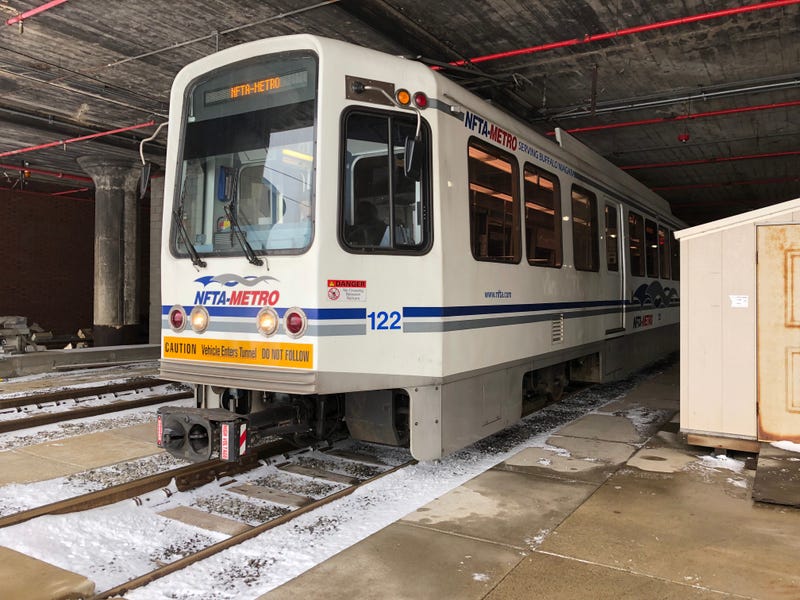
Buffalo, N.Y. (WBEN) - A survey commissioned by the Niagara Frontier Transportation Authority (NFTA) shows a positive outlook on the proposed Metro Rail expansion, which would extend light-rail service through the towns of Amherst and Tonawanda to the University at Buffalo North Campus and the I-990.
The poll, conducted by the Siena Research Institute (SRI), reveals strong and growing support across Western New York, with 72% of residents surveyed in Erie and Niagara Counties voicing their approval for the project — a notable increase from a similar poll conducted in 2016.
According to the poll, nearly three-quarters of residents in Erie and Niagara counties support the proposed light-rail expansion, with more than 80% of people predicting it will be used, and 42% of those people saying they, themselves, will utilize the service.
In the towns of Amherst and Tonawanda, support remains high at 71%, with support cutting across party lines, age groups, income levels, and other demographic categories by more than a 2-to-1 ratio.
Support for light-rail expansion also appears to be growing, according to the new poll, with a 4% increase of respondents being in favor of expanding the service, which is up from 66% in 2016.
These poll results come as no surprise for Doug Funke, president of Citizens for Regional Transit, a group in favor of the expansion of light-rail service in Western New York.
"Everybody is starting to realize we need better public transportation, and here we have an opportunity to make it happen here in Buffalo. We're kind of unique here. A lot of cities like Rochester, a lot of cities our size would love to have a light-rail system, but they're starting from scratch. We've got one, and we have an opportunity to make it better and extend it," said Funke in an interview with WBEN. "And we hope to eventually get to the full system, the 36-mile system that was originally planned. This is the first step for doing that, so we're very excited about that and supportive of it."
The poll shows that more than 70% of people feel an expansion will connect people to jobs, boost economic development, and provide long-term, safe, and efficient transportation. Meanwhile, 68% of respondents disagree with the statement that light-rail expansion is unnecessary.
Funke also feels the expansion of light-rail service locally will help clear some traffic congestion.
"There's more-and-more-and-more-and-more congestion everywhere you go, and the only way to really get people out of their cars, understandably, is light-rail," Funke said. "Light-rail is a comfortable system, it carries a lot of people. It's fast, faster than driving or certainly as fast as drive, unlike buses, which gets stuck in traffic. It's an opportunity. It's an option to make transit a viable and competitive choice to driving for everybody. It'll get people out of their cars and it'll reduce congestion, because it carries over 500 people every 10 minutes, compared to buses that are carrying 40, and this bus rapid transit would carry 60 per-bus."
Another benefit to having more light-rail tracks across the region is the environmental aspect.
"You look at the new New York State law, the Climate Leadership and Community Protection Act, it calls for reducing greenhouse gases as a way of fighting climate change. And it calls for, I think, 85% reduction in greenhouse gases by 2050," Funke noted. "Transportation is one of the biggest, and also housing, heating - the two big sources of greenhouse gases - the only way to do is get people out of their cars. And it's hard, I understand. I have a car, there's places you really can't get to. But now, as we extend light-rail, there's more opportunity to connect the park-and-rides to get downtown, or just to move around within the city. It'll start to really make a positive impact on fighting climate change and pollution."
On the flip side, 58% of respondents acknowledge the potential for construction and noise impacts in the community. Respondents are also divided on potential property value impacts, with 41% agreeing and 48% disagreeing that values could suffer.
However, Funke believes it's time to start changing how many peope move around, and it has to be a system that people will use.
"It's effective and it works, and light-rail can do it. And like I say, in Buffalo, we're lucky. We've got one, we've already got one. So it's a $2 billion investment so we can leverage that and have a system that works for everybody," Funke said.
The NFTA, along with its partners say they will continue engaging with the public and stakeholders as the project progresses, ensuring transparency and responsiveness to community input.
Meanwhile, WBEN reached out to STOP the Metro, a local group that opposes the idea of light-rail expansion. However, organizers declined to comment on the matter.
